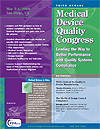|
Why
People are Talking About the Medical Device Quality Congress…

“As a repeat attendee,
I highly recommend this conference. The workshops, interactive sessions
and insights from reputable speakers are very useful and applicable
information to take back and share with my company and colleagues.”
Heather Jalisi, Quality Assurance Manager, DexCom Inc.
“I would recommend the
seminar in view of strengths of topics discussed and speakers who are
well respected in industry.”
Remy Estera, Team Leader, Quality Assurance in Manufacturing, Resmed
Ltd. Australia
“It
was extremely refreshing to attend a conference with the focus on
Medical Devices. Too often with conferences the focus is on drugs. This
conference was very well done!”
Joseph Sondej, Associate Manager Quality Control, Celgene Cellular
Therapeutics
“One
of the most beneficial Congress’ I have ever attended.”
Alejandro Lamas, Quality Assurance Manager, Medtronic Mexico
“Compilation of insightful presentations, covering issues faced by every
device manufacturer, presented by industry leaders.”
Chris Lake, Manager Quality Assurance and Regulatory Affairs, Epimed
International
|
|
Featured
Presentations:
|
Gaining Value From
Implementing ISO 14971/Risk Management for
Medical Devices. U.S. and Worldwide Expectations
> Scott Cohn
QA Compliance Team
Stryker Othopaedics |
Risk Management
is rapidly gaining focus as an integral part of
medical device design. Learn how to incorporate
an effective risk management system into your
design and development programs. This
presentation will cover the expectations of the
FDA as well as other worldwide regulatory bodies
with regard to managing patient risk, as well as
the common pitfalls inherent with many risk
management programs. The information presented
will help companies not only meet industry
expectations, but will also help them learn how
to gain internal value from an effective risk
management system.
About
Scott Cohn:
Scott is a 15-year veteran of the medical device
industry. He has worked for several large and
small companies implementing and/or improving
their quality management systems. He is
currently a member of the QA Compliance team at
Stryker Orthopaedics, the largest division of
one of the world’s leading orthopaedic device
companies, where he recently led a
multi-disciplinary cross functional team that
designed and implemented a new risk management
system.
|
|
Lessons
from Litigation:
Utah Medical Products, Inc. and Good
Manufacturing Practices
> Larry Pilot
Partner
McKenna, Long & Adridge |
Mr. Pilot will cover several
lessons learned, including:
-
Inspections and Administrative Follow-up
- Warning
Letters and Certificates to Foreign
Governments
- Suing the
Food and Drug Administration
- When FDA
Sues
- The
"Sign or Sue" Letter
-
Settlement Options
-
Consent Decree/Disgorgement
-
Litigation
- Litigation
- Federal Rules of Civil Procedures
- Trial and
Opinion
|
|
Risk Management—
A complete Life Cycle Approach
> Dr. Harvey Rudolph
Global Program Manager, Medical Devices
Underwriters Laboratories, Inc. |
There is no
question that risk management is required in all
major medical device markets. Regulatory
authorities worldwide expect manufacturers not
only to manage risks during the design phase,
but also to apply risk management principles
throughout the product life cycle.
To accomplish
this, manufacturers must utilized all of the
quality data generated within their quality
management system.
Using ISO 14971
and ISO 13485 as models, this presentation will
examine how to integrate risk management
principles into a quality management system so
that the complete life cycle approach to risk
management can be realized. Common mistakes made
as well as hurdles to overcome in accomplishing
this will be discussed. |
China
Regulatory Compliance for Medical Device
Companies - Challenges and Opportunities-
>Chang-HONG
WHITNEY
President
Whitney Consulting Limited |
With the growth of
the Chinese medical device market, Chinese
government is tightening up its controls and
regulations on the medical device products.
State Food and Drug Administration (SFDA) is the
top government agency that formulates and
implements policies and regulations for this
industry. Since 1998, SFDA has been gradually
improving its regulations. The policy issued in
Year 2000 formalized product registration,
safety testing and management of medical device
manufacturers. This seminar is aimed to explore
the SFDA functions and regulations that pertain
to US medical device manufacturers and their
products on the Chinese market. The speaker will
share her extensive experience and expertise in
managing China regulatory compliance,
registration process, challenges and
opportunities. Topics will include product
registration, type testing, labeling, industry
standards, manufacturing compliance, vigilance,
and other related subjects that affect medical
products in China.
About
Chang-Hong Whitney:
Ms. Whitney has been in the medical device
industry for more than 15 years and doing
business in China for more than a decade. She
established and managed her company in China
since 1994 and has been consulting for
multinational companies in business development,
strategy and market research. She is an expert
on China regulatory affairs and has written
articles on this subjects and frequently
speaking to the medical communities. She is also
an adviser and consultant to the investment
community on investments to the Chinese medical
industry. Ms. Whitney holds MBA from Babson
College (Wellesley, MA) and undergraduate
degrees in Electronic Engineering and
International Business from Chinese
universities. |
Design Inputs and Design
Outputs
>Harvey Weintraub
Manager Design Control
System Development Core R&D
Abbott Laboratories |
Mr. Weintraub
will cover:
-
Who the customer is
-
Definition of Design Inputs and what else to include
-
Definition of Design Outputs and what else
to include
|
Strategies for Effective
Medical Device Reporting
>DEbbie
Yoder
Nurse Consultant, Reporting Systems Monitoring
Branch,
Center for Devices and Radiological Health
U.S. Food and
Drug Administration
>Mary Brady
Deputy Division Director, Division of
Surveillance Systems,
Office of
Surveillance and Biometrics, Center for Devices
and Radiological Health
U.S. Food and Drug Administration |
This presentation
will cover the following key points:
-
Explanation of MDR reporting requirements
- What is
and isn't reportable and why?
- Key
terminology
- Examples
of effective MDR activities
- How to
avoid pitfalls in decision-making criteria
for what to report
- The risks
of failing to report
-
When and how FDA
communicates with foreign governments
|
Medical Device Reporting:
Problem Solving Exercise in a Team Environment
>Mike
Crader
Vice President
Regulatory Affairs
Hill-Rom |
Utilizing
problem-solving exercises in a team environment,
attendees will learn to apply their technical
expertise in the application of Medical Device
Reporting principles to real life examples.
Attendees will be challenged to understand
issues that commonly face industry such as:
-
Determining user error, misuse, or abuse
- Timely
reporting and when the clock starts ticking
- Serious
injury and what is meant by medical or
surgical intervention
- How many
reports to file for multiple incidents,
multiple products used in an incident, or
multiple products implicated in an incident
|
Everything You Need to Know
About FDA Enforcement Actions
>MaRK BROWN
Partner
King & Spalding LLP |
This presentation
will cover the following key points:
-
Types of FDA
enforcement actions
-
How to avoid
enforcement actions
-
What to do if
you are the target of enforcement actions
-
How to recover
from FDA enforcement actions
About
Mark Brown:
Mark Brown is a
partner in the firm’s FDA/Healthcare Practice.
He joined the firm after serving five years with
the U.S. Food and Drug Administration (FDA)
Office of the Chief Counsel. Mr. Brown
represents clients on various FDA regulatory
compliance issues, including manufacturing
practices, product failure investigations,
factory inspections, clinical trials, adverse
event reporting, recalls, product labeling,
advertising and promotion issues and criminal
investigations. He also regularly advises
clients on developing strategies for obtaining
FDA approval and clearance for medical products.
Mr. Brown has
extensive experience in FDA compliance and
product approval issues that arise in products
liability litigation involving medical devices
and in advertising disputes between competing
companies pursuant to the Lanham Act. |
Ensuring Success in
Application Submission and Approval -- Major
Considerations in GCP, QSR and GLP
>Charma A. Konnor, R.Ph., RAC
Senior
Manager/Consultant, Devices and Drugs
Phoenix Regulatory Associates, Ltd. |
Key points for
success in application submission and approval.
How to avoid pitfalls and systemic mistakes that
can lead to failure such as:
- no
application approval
- delay in
approval
-
application integrity problems
|
|
|
Presented by:

&

Sponsored by:


|
|







